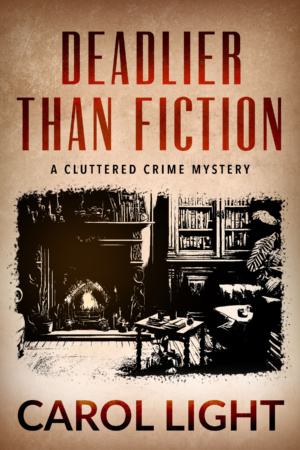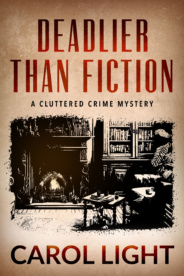Start reading this book:

Share This Excerpt
Chapter One
“What the hell have you done?”
Don Shirley’s ruddy complexion had darkened two shades beyond puce. His reaction to decluttering his den wasn’t what Crys had expected and certainly not what her fledgling career as a professional organizer needed.
She brushed dust from her hands. Stay calm. “I know it looks like a disaster at the moment, but don’t worry—we’re not finished yet.”
His eyes widened. He turned around, taking in the entire room. Following his gaze, she realized why her words, intended to be reassuring, had alarmed him. The wood-paneled den looked bare, as if it belonged to someone in the process of moving. The only pieces of furniture remaining were the largest: a sectional and a mahogany china cabinet. Five open cardboard boxes filled with items from the built-in cabinetry around the fireplace awaited today’s sorting session.
“What I mean is we’re in the process of determining what to bring back into the room. It helps to clear everything out to see what should be kept and what should be tossed. Or donated,” she added, in case Don, like his wife, Barbara, was big on second chances. “After the room is emptied, we start bringing items back in and determine what works with your plan for the room.”
It was only a thumbnail sketch of what she did when tackling a room as a professional organizer. The plan for this den was to make it more of an adult space and less of a child’s playroom—or at least that was the vision Barb Shirley had shared. Her granddaughters, who had played here, were now ten and twelve and living in Champaign. Barb wasn’t optimistic about her other daughter ever having children, which made letting go of the toys easier. They had already donated a large plastic child’s kitchen, a dollhouse, and a collection of Barbie clothing and accessories that her grandchildren had outgrown.
Apparently Barb hadn’t shared her vision for the den with her irate husband, who was now peering around the back of the china cabinet. She also wasn’t in the room to explain.
“The bookcase is gone. What did you do with it?”
“Do you mean the short one that was over there?” Crys gestured toward the spot on the bare wall where his gaze had frozen. “Three shelves filled with hardback novels?”
“You haven’t—” He paused. Beads of sweat glistened in the spikes of his closely cropped salt-and-pepper hair.
To her relief, his wife chose that moment to return. “Oh, Don. Are you fussing about that old bookcase? It’s in the garage with the other furniture for now. We couldn’t move these big pieces, but—”
Barb’s husband didn’t wait for her to finish. Instead, he rushed into the kitchen, which had access to the garage. A door slammed, hard.
“Well, thank you very much!” Barb said, hands on hips as she looked in the direction her husband had gone. Her eyebrows arched beneath the bangs of her blond hair styled in a sleek pageboy. “He’s got to be kidding me if he’s that upset over an old bookcase. He hasn’t read a book in years. I’m surprised he even noticed it was gone.”
Oh, he’d noticed all right. Many of her clients had emotional attachments to at least some of their possessions. Encouraging them to let go of items with sentimental value that no longer served them was one of the most challenging aspects of her job. It was a process requiring patience. First they had to identify their vision for their space, and then she encouraged them to narrow their keepsakes to only a few special pieces that captured their most important memories or sense of self. One person’s junk was another person’s treasure, and what seemed ordinary or even ugly to her could evoke quite a different reaction in her client.
A bookcase, for example.
“We can incorporate it back into the room, if that’s what he wants,” Crys said. Maybe painting it would helpful—or using it as an end table next to the sofa? Or perhaps it would work in a bedroom upstairs. There were tons of possibilities.
Barb waved a hand as if brushing away a fly. “That’s not what I want. I don’t even remember where that bookcase came from. Now, this monstrosity,” she rapped her knuckles on the china cabinet, “was his mother’s. We brought it here when we took Alva in during her last months. I hope you’re not superstitious. She died in this room.”
Crys murmured a sympathetic reply. She wasn’t superstitious, although on her first visit, she’d sensed the den’s sad, low-energy vibe. She had ascribed it to the abandoned toys and mismatched furniture. The room had become a catchall for past lives: children and grandchildren who had grown older and a mother-in-law who had passed.
“We rented a hospital bed and placed it right over there,” Barb continued. “I thought having some of her furniture surrounding her would make her feel more at home. She was always proud of her china cabinet, so in it came. We filled it with some of Alva’s favorite knickknacks. That green-striped armchair we moved into the garage was hers, too. She always sat in it before she became too weak to leave her bed.”
That explained the odd assortment of furniture in the den. Crys pictured a hospital bed against the wall across from the fireplace. As a location for a bedridden patient, the room was a good choice. The Shirleys’ three bedrooms were upstairs, but this space conveniently adjoined the kitchen and had access to a powder room just off the entrance hall. It would have been easier to care for Don’s sick mother here than to manage stairs. The den could also be easily accessed by visitors coming to see the dying woman.
“It was very thoughtful of you to surround her with her own furniture. Not many people would go to all that trouble.” Not many people today would provide care for an elderly relative at home. Crys couldn’t imagine caring for her own mother-in-law as Barb had done. Her client was truly a saint.
Barb did her fly wave again. “There were practical reasons for doing it.” She lowered her voice to a whisper, as if her deceased mother-in-law could hear her. “We didn’t tell her we’d already begun to clear out her house.” She frowned. “Come to think of it, Don didn’t seem to have any problem doing that or selling the home where he grew up. Of course, his brother, Bob, was all for it, too. He’s not the least bit sentimental, and his wife wanted it sold as soon as possible.”
“Still, it must have been a comfort for your mother-in-law to be surrounded by familiar items.” Maybe Don, too.
Barb laughed. “Unfortunately, no. Every time she looked at that china cabinet, she asked me why she was in a bed in the dining room. I think it confused her more than anything.”
There was a sharp rap at the front door. Barb excused herself to answer it.
“Ma’am, we’re finished.”
“You’ve removed that hedge already, Carlos? That was fast work,” she said. “Come in out of the cold. I’ll get my purse.”
“Oh, no, ma’am. We’re—”
“Come in, come in. A little dirt doesn’t bother me.”
When Barb crossed through the den into the kitchen, Crys moved to where she could see the two men standing just inside the front door. They both wore lived-in jeans and identical black T-shirts with the bright yellow OutStart logo of Barb’s nonprofit organization that assisted many released felons—or “returning citizens,” as she referred to them—to find training and work to restart their lives in the community. The larger man, whose dark hair and swarthy complexion suggested Hispanic heritage, smiled at her. His companion hung back. He was a thin, pale, wisp of a man. Dirt on his hands and black work boots seemed to be the only things about him that grounded him to the earth. As if sensing her gaze, he wiped a muddied hand on his bib overalls.
Barb returned with cash and paid them.
Carlos said thanks and pocketed his money. “We could start planting tomorrow, if you like.”
“Oh, I haven’t had a chance to go pick out the plants. Crys, would you excuse me for a moment? I need a quick consultation with my landscaping experts here.”
“No problem. I’ll start without you.”
When Barb and the men left, Crys checked her phone. Kurt had sent a text to check in at four, the same time she had arrived here:
Home with Rafe.
No surprise there. Her son’s best friend was often at their house.
He’s invited for dinner, she replied.
Dana was at her best friend’s house. With her children organized, Crys pocketed her phone. No need to text Rick. She should be home before her husband.
A door slammed from the direction of the kitchen, startling her.
“Barb, where are the books? I looked all through the stuff in the garage. Don’t tell me you—Where’s Barb?”
“She’s outside with Carlos talking plants.”
Don pursed his lips. He had what Crys’s mother would call a rosebud mouth, adorable on babies but unusual on grown men. His complexion, which seemed to easily flush, had again darkened.
“She’ll be right back, but maybe I can help you, Don. Did you find the bookcase?”
He glanced toward the hallway before turning back to her. “The bookcase? Yeah, but it’s empty. Where are the books that were in it?”
He wasn’t going to like her answer. “We gave them all away.”
End of Excerpt










